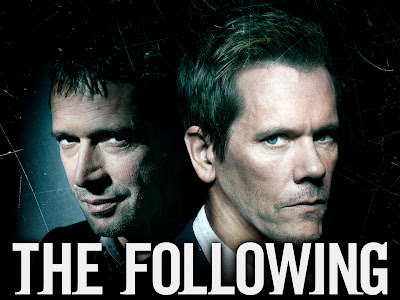The Following Season One Review
It's over--for now. The Following, Fox's attempt at the kind of serialized horror that has proven to be successful on cable TV with shows such as Dexter, The Walking Dead and American Horror Story, wrapped up its first 15 episode season last Monday. I love horror, so I can't fault a major network for trying to bring new horror TV shows to prime time. However, after a strong start, a great cast and some intriguing ideas, The Following sputtered to the end of its initial run with a lot of sound and fury that signified very little. Read on for my complete review of this show's freshman season.
For those of you who haven't seen The Following yet, it's about a college literature professor-turned-serial killer Joe Carroll (James Purefoy) and the FBI agent who caught him, Ryan Hardy (Kevin Bacon). The series begins with Carroll escaping from prison and the FBI bringing Hardy in to capture him again. Yet after Carroll is brought back into custody, Hardy and the FBI discover that Carroll has been using his years in prison to build a cult of devoted followers from around the country to do his bidding. The cult is rooted in Carroll's twisted interpretations of the writings of Edgar Allen Poe, and its members are determined to carry out a sinister master plan that involves Hardy and Carroll's ex-wife, Dr. Claire Matthews (Natalie Zea).
The biggest problem I have with The Following is how thinly developed the main villain and his cult of minions are. There were times when the show's premise--a serial killer and his followers committing murders based on classic literature--reminded me of the excellent Vincent Price film, Theatre of Blood (1973). In that film, Price played Edward Lionheart, a deranged Shakespearean actor who leads a troupe of follow lunatics on a killing spree of critics who he believes destroyed his career and each murder is based on a scenario from Shakespeare's plays. The significant difference, though, is that while Theatre of Blood made ample usage of Shakespeare and British theatre culture as part of its plot, The Following doesn't really know what to do with Edgar Allen Poe and the macabre literary tradition that he followed.
Sure, many episodes referenced some of Poe's more popular works and they even had cult members running around in rubber Poe masks, but what exactly draws Carroll and his followers to Poe's work enough to make it the basis of a murderous cult ideology is never explored in any significant depth. It felt like Williamson believed that frequently name-dropping a horror icon such as Poe in his series would make The Following scarier by extension. It didn't, and it instead revealed how much Williamson doesn't understand about Poe specifically and Gothic horror in general.
Williamson's inability to convincingly portray the obsession that Carroll and his cult have with Poe led to other problems throughout the series. Without developing the Poe-centric ideology of the cult, the cult itself never materializes as a distinct presence within the show. If anything, the cult becomes an excuse to show characters doing violent and crazy things at key, plot-driven moments; yet because the characters in question lack any discernible motivation, all they are good for is an occasional jump scare and nothing more. Furthermore, without a core ideology, Carroll's supposed plan for his cult never comes to fruition--largely because Carroll's behavior and decisions during the second half of the season cast considerable doubt on whether he had any plan in the first place. Indeed, the version of Carroll we see at the end of the season seems much more like a hack writer and vengeful lover than a criminally brilliant, serial killing cult leader.
(Don't take it too hard, Professor Carroll. I can think of a few Cylons who can sympathize with the desire to kill lots of people but are also unable to devise a good master plan that will make the most out of such murderous desires.)
We were supposed to have a plan too, dammit!
Looking back, it felt like there were two conflicting plots in The Following: One is about a serial killer who uses his psychological manipulations of an FBI agent as the basis of a novel, and the other is about a serial killer who develops a cult of killers-in-training on an estate within a gated upper-class community. In the hands of a talented writer and production team, either of these plots could have been the basis for genuinely terrifying television entertainment. Yet in the hands of Williamson, neither of these plots--which share the common character in Carroll--amount to much, which leaves viewers with a horror TV series that alternates between a prolonged cat-and-mouse chase between FBI agents and assorted killers and scenes between cult members that play out like some kind of soap opera populated by attractive crazy people. Such a series does have a fair amount of strange, creepy moments, but it doesn't make for memorable TV either.
I've heard that The Following has been renewed for a second season, so I'm hoping that this show will improve when it returns. Yet if Williamson is content for his show to be nothing more than 24 with serial killers--which is what seems to be the case so far--then The Following will never become a distinct horror show of its own.






Comments
Post a Comment